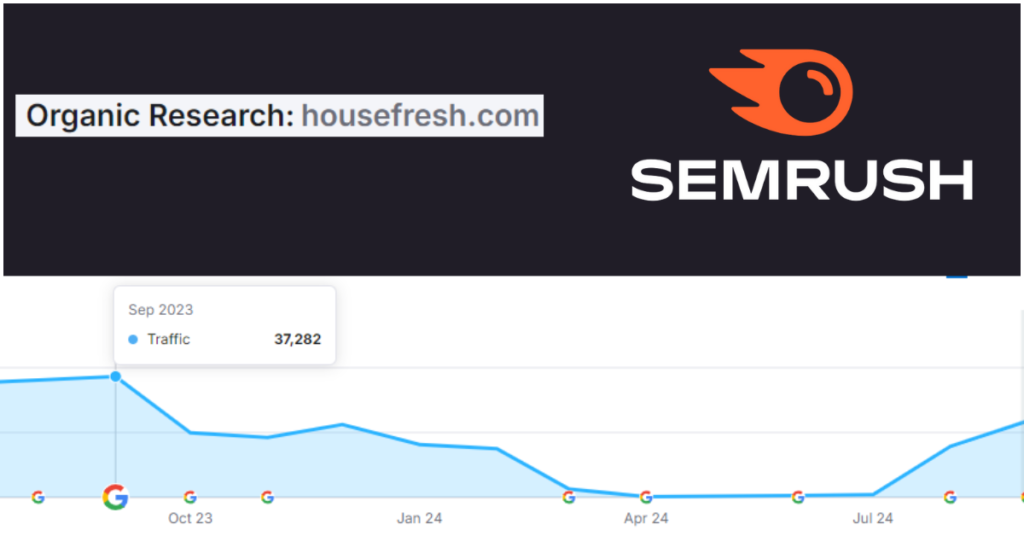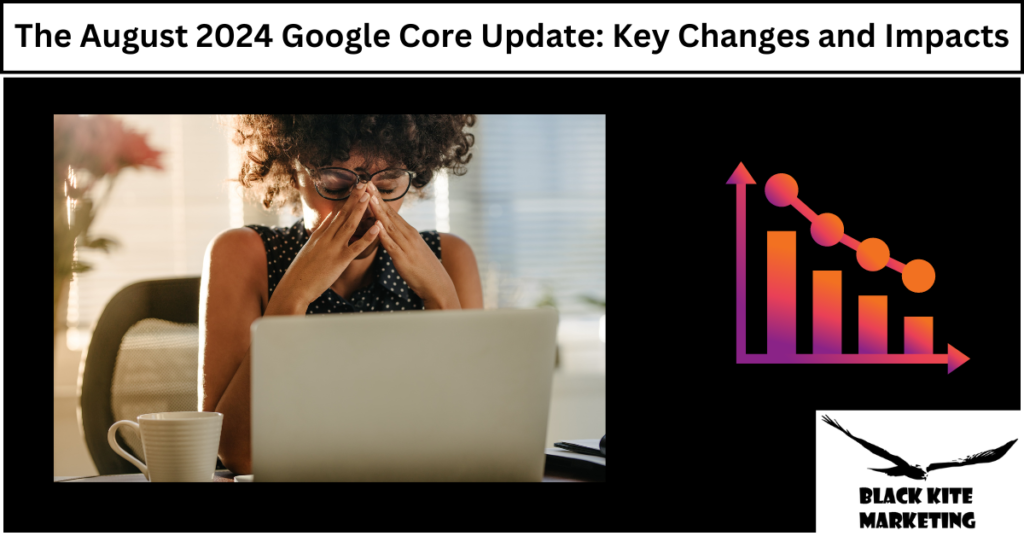In the ever-changing landscape of digital marketing, staying updated with search engine algorithms is crucial for anyone looking to maintain or improve their online presence. The August 2024 Google Core Update, which rolled out from August 15, 2024 and completed 19 days later on September 3, 2024, brought significant changes aimed at enhancing the relevance and quality of search results. As with previous core updates, this rollout is designed to prioritize high-quality content while demoting sites that fail to meet Google’s evolving standards.
In this post, we’ll delve into the key changes introduced in the August 2024 update, explore its impacts on various types of websites, and provide actionable insights to help you adapt and thrive in this new search environment. Whether you’re a seasoned SEO professional or a business owner looking to improve your site’s performance, understanding this update will help you navigate the complexities of Google’s search landscape.
Key Changes in the August 2024 Update
This latest update is aimed at addressing the feedback Google received from various creators and stakeholders. With this update Google wants to connect users with a wider range of sites so that small or independent sites can rank. The idea is that the relevancy and quality of the content will be a higher factor in ranking than the size of the site.
Another aspect of this update is for the search engine to better recognize improvements that websites have made, ensuring that the most updated content is showing up in the results.
Impacts on Smaller Independent Projects
During previous updates – The Helpful Content Update in September 2023 and The March 2024 Core Update – many smaller sites were hit hard. One site in particular, House Fresh, went viral for sharing their discontent with this. We ran their website through SEMrush to see how their site has been affected over time:

As you can see back in September their traffic was at a high point but it immediately dropped drastically following the September Helpful Content Update. The site took another blow in during the March 2024 Core Content Update bringing traffic to an all time low.
Following the most recent August 2024 Core Update we do see that their site started to recover from the loss. This does seem promising that Google is aiming to address the issues raised by smaller independent projects.
Adapting to August 2024 Google Core Update
Here are best practices for businesses to adapt, improve, and recover:
1. Actionable Tips to Improve Content Quality
Conduct a Comprehensive Content Audit: Review your site’s content to identify gaps, outdated information, or thin content. Focus on relevance, accuracy, and user intent.
User-Centric Content: Write content that answers user questions thoroughly and clearly. Structure content with headers, subheadings, and bullet points to improve readability.
Improve Depth & Originality: Offer unique insights, analysis, and data that are not found on other sites. Avoid duplication or simply rewording existing material.
Update Old Content: Regularly refresh content with updated information, statistics, and insights to remain current and valuable.
Enhance Visuals: Use images, infographics, and videos to supplement the text. Rich media improves user engagement and can boost rankings.
2. Enhancing E-A-T (Expertise, Authoritativeness, Trustworthiness)
Showcase Author Expertise: Clearly list the credentials and expertise of content authors. Provide author bios with relevant qualifications and experience, and link to social profiles or professional pages to build trust.
Cite Reliable Sources: Back your claims with authoritative sources such as studies, research papers, and recognized industry leaders. Properly referencing external sources can boost credibility.
Secure Website: Ensure your site uses HTTPS for security. Users and Google favor secure websites, which boosts trustworthiness.
Earn Quality Backlinks: Seek backlinks from reputable websites within your niche. Building relationships with authoritative websites can enhance your site’s perceived authority.
User Reviews and Testimonials: Display genuine reviews, testimonials, and case studies that speak to the quality of your products or services. Social proof reinforces trust.
3. Strategies to Recover from Ranking Drops
Identify Affected Pages: Use Google Search Console and analytics tools to pinpoint which pages or keywords experienced a drop. Analyze their performance before and after the update.
Improve Page Experience: Optimize for Core Web Vitals (page speed, mobile responsiveness, interactivity). A better user experience directly impacts rankings.
Focus on Intent Matching: Align content more closely with user search intent. Google increasingly emphasizes content that matches specific user needs, so adjust content to fulfill intent at every stage of the buyer’s journey.
Optimize On-Page SEO: Review title tags, meta descriptions, alt texts, and internal linking structure. Ensure they are still relevant to search queries and are optimized for new ranking signals.
Competitor Analysis: Analyze competitors who gained rankings during the update. Identify what they are doing differently in terms of content structure, keywords, and E-A-T to adjust your own strategies accordingly.
Rebuild Trust & Authority: If trustworthiness is affected, reassess your backlink profile. Disavow toxic links and build relationships with authoritative sites to regain your site’s trustworthiness.
4. Technical SEO Considerations
Fix Indexing Issues: Ensure there are no crawl errors, and important pages are indexed correctly. Use tools like Google Search Console to spot and fix any issues.
Improve Mobile Usability: Ensure your website is fully responsive and optimized for mobile devices, as mobile usability continues to be a critical ranking factor.
Structured Data: Implement structured data (Schema.org) where appropriate to help search engines understand your content better and improve visibility in rich snippets.
Monitoring Your Site’s Performance
Tracking your website’s performance is crucial to understanding how the August 2024 Google Core Update has affected your rankings and traffic. Here we’ll cover how to effectively monitor changes, the tools you should be using, and the metrics that matter most.
Monitoring changes in your website’s rankings and organic traffic is essential for understanding how the update has impacted your site. Here’s how to stay on top of it:
- Set Up Regular Monitoring: Schedule consistent checks of your website’s traffic and ranking performance to spot any trends early. Set up benchmarks prior to the update so you can measure changes accurately.
- Segment Your Traffic: Distinguish between organic search traffic and other sources like paid, direct, or referral traffic. This will give you a clear view of how the update has affected your site’s search visibility.
- Track Keyword Performance: Focus on your most important keywords to monitor their ranking changes. Pay attention to both your main keywords and new queries that are driving traffic.
Important Metrics to Track:
- Organic Traffic: Regularly check daily, weekly, and monthly traffic fluctuations from search engines.
- Ranking Changes: Follow your keyword positions and identify whether they’ve improved or dropped.
- Click-Through Rate (CTR): Measure how effectively your pages are drawing users from search results.
- Bounce Rate & Dwell Time: If users are bouncing off pages quickly, it could mean your content no longer matches search intent or provides value.
Recommended Tools and Metrics for Analysis:
- Google Analytics
- Google Search Console
- SEMRush
By using Google Analytics, Search Console, and third-party platforms, you can gain a comprehensive view of your site’s health and make informed decisions to boost your rankings.
Conclusion: Navigating the Impact of the August 2024 Google Core Update
The August 2024 Google Core Update has once again reshaped the digital landscape, emphasizing the importance of high-quality, user-centric content. The good news is that many of the smaller sites that were hit hard by previous updates are starting to recover. That being said, it is important for businesses to continue to adapt to these changes.
Whether it’s reassessing your SEO strategy, improving technical performance, or refining your content to align with Google’s latest focus, staying ahead of the curve is key to long-term success.
At Black Kite Marketing, we specialize in navigating the ever-evolving SEO world. If your business has been affected by this latest update or you’re looking to future-proof your digital strategy, we’re here to help. Contact us today for a free SEO audit and tailored recommendations to keep your site optimized and competitive.

